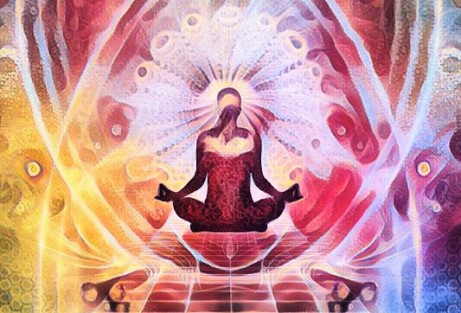King Prasannachandra (was also known as Prasenjit) was ruling the kingdom of Potanpur. He was a brave and righteous ruler. People felt happy, and secure under his rule. He had a beautiful wife and a charming young son. He was inspired by Tirthankar Mahavira’s sermons and was convinced that the well being of the soul was in renouncing the world. He was eagerly waiting for his son to mature so that he could handover the administration of the kingdom to him.
One day King Prasenjit was gazing at the sky from the window of his palace. As he watched, the clouds moved and withered away with the flow of wind, it suddenly dawned to him the transient nature of life. Like clouds, life can end anytime. There is no end to this cycle of birth and death unless I did something about it, he thought.
He decided to renounce the world right there without wasting a single moment. He transferred his royal authority to his young son. He was confident about the safety of his son under the guidance of his trustworthy minister. He took Diksha (monkhood) from Lord Mahavira and earnestly began his penance and meditation.
A few days later, Lord Mahavira arrived at the city of Rajgruhi along with other monks. King Shrenik the ruler of Magadh was on his way to pay homage to Mahavira when he saw royal sage Presanjit standing on one leg and both hands raised, engrossed in deep meditation. He was awestruck looking at the intensity of his penance. He bowed to the sage and continued on his path.
Upon reaching Lord Mahavira and after paying his respect, King Shrenik asked –
“O Lord, on my way I saw a sage with a bright glow around him doing intense penance. If he were to die now, what state would his soul attain?”
Lord Mahavira replied –
“King Shrenik, he is Rajarshi Prasenjit and if he were to die at this moment, he would go to hell.”
King Shrenik and the people there were shocked to hear that. King Shrenik was puzzled about how a sage of the stature of Prasenjit would end up in hell. Thinking that he might not have heard the utterance of Lord Mahavira properly, he asked the question again –
“O Lord, In the event that sage Prasenjit dies at this moment, what state his soul would attain?”
Lord Mahavir said, “He would attain liberation (moksha).”
Equally puzzled by these words, king Shrenik said –
“Lord, the first time you said that he would go to hell and now within just a few seconds you said that he would attain moksha – the ultimate liberation. Why such a contradiction?”
Answering to King’s curiosity, Lord Mahavira said –
“When you asked the first time, the monk had just heard someone saying that king Dadhivahan of Champanagari had attacked and had laid a siege to the city of king Prasenjit. His ministers had betrayed him and conspired to deprive him of the kingdom by killing the child-king.
On listening to this, Sage Prasenjit became angry and his mind became a battlefield of violent and aggressive thoughts. He started fighting the war in his mind trying to rescue his son. As a result, he was entangled in such karmas, it would have sent his soul to the seventh hell.
In the battle, he had exhausted all his weapons so he reached his head to take his heavy crown and hit the enemies with it. As soon as he touched his shaved head, he was awakened to reality. Soon he began to think, “What am I thinking? I am engaged in saintly penance and have left behind all my attachments, relationships. Awakened to such a realization, sage Prasannachandra felt repentant and once again concentrated on his penance. So when you asked the second time, he had reached the highest state of awakening which would liberate him.”
Just then divine music was heard from the skies. Lord Mahavir said –
“He has attained enlightenment now.”

Wisdom Bite
There is profound wisdom in this story about the power of thoughts. If you think for a moment, the world you see around is the result of the thoughts. Car Benz thought of creating a car, while Robert Oppenheimer thought of creating a nuclear bomb. The fight for freedom from slavery and oppression started with a thought that got seeded in Mohandas Karamchand Gandhi. Putting out this story was the result of a thought.
Any outcome you see was a result of thought first. Thoughts are a form of energy which when manifested through actions will produce an outcome. So it is important to be aware of our thoughts. It can transform an individual or has the power to destroy the world (remember Hitler?)
A result is an outcome of the manifested thought.
A recent study says an adult has on an average of ~6200 thoughts (I have no idea how they counted though :)) per day. That’s a lot of thoughts! Most of it is nonsense chatter. Important thing is, what thoughts we nurture and what we should drop. Focus on positive and optimistic thoughts.
There is a subtler aspect of thoughts. They affect our soul/consciousness deeply at the karmic level. We will never get punished by any law or the judiciary for killing someone in our thoughts but it will have a bearing on our consciousness. The bonding with karma will depend on the intensity of our thoughts. Stronger the intensity, the stronger the bonding. So it is crucial to repent any negative thoughts to cleanse our consciousness like what Rajarshi Presenjit did.





